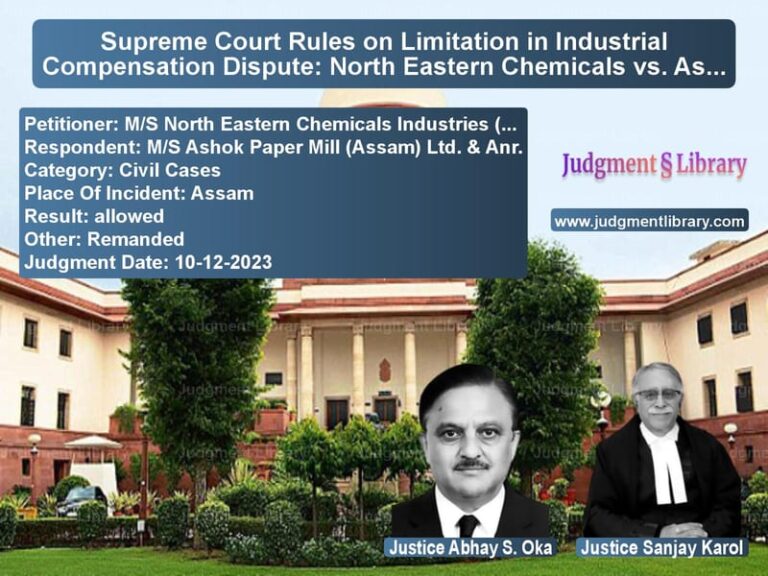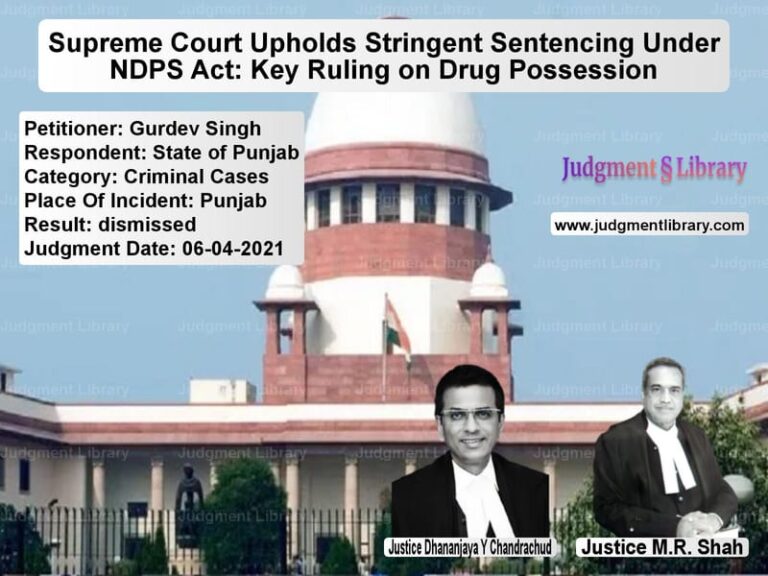Lease Violation and Misuse Charges: Supreme Court Ruling in Union of India v. Satish Kumar Mehta
Introduction
The case of Union of India & Anr. v. Satish Kumar Mehta (D) Thr. LRS pertains to a crucial dispute involving misuse charges on leased property. The key issue in this case was whether the lessee (respondent) was liable to pay the full misuse charges imposed by the appellants for alleged violations of lease conditions. The case brings attention to the legal principles governing misuse of leased premises, the rights of landlords (in this case, the government), and how courts determine financial liability when a lessee sublets or misuses a property.
The Supreme Court’s decision ultimately reaffirmed that lease agreements must be strictly enforced, and violations can lead to financial consequences. However, it also examined the fairness of the charges and whether they should be limited based on the income generated by the lessee.
Background of the Case
The respondent, Satish Kumar Mehta, was the lessee of a property owned by the Union of India. The property was sublet for non-residential purposes, allegedly in violation of the lease terms. The Union of India imposed misuse charges of Rs. 42,11,604 on the respondent for unauthorized use of the property. The respondent challenged the charges before the Delhi High Court, arguing that:
- The charges were excessive and disproportionate to the rental income.
- The lessee was not personally responsible for the misuse; the subtenant should bear the liability.
- The charges imposed were arbitrary and not legally justified.
The High Court ruled in favor of the respondent and significantly reduced the payable amount. Dissatisfied with this decision, the appellants (Union of India) approached the Supreme Court, arguing that the full misuse charges should be enforced.
Legal Issues Raised
- Was the respondent legally bound to pay the full misuse charges imposed by the Union of India?
- Did the High Court err in capping the misuse charges based on the lessee’s rental income?
- Should the lessee be held fully liable for subtenant violations?
- Can procedural technicalities affect the enforceability of lease terms?
Arguments by the Appellants (Union of India)
- The lease agreement was violated, and the lessee was liable for the full misuse charges, regardless of the rental income received.
- The High Court’s ruling incorrectly limited the misuse charges to the lessee’s rental income instead of enforcing the actual amount due.
- Allowing such a reduction in charges would set a wrong precedent and encourage other lessees to ignore lease conditions.
- The charges were legally justified under the lease terms, which clearly stated that unauthorized use would attract financial penalties.
Arguments by the Respondent (Satish Kumar Mehta)
- The lessee did not personally misuse the property; the subtenant was responsible for the unauthorized usage.
- The Supreme Court’s ruling in DDA v. Ram Prakash (2011) 4 SCC 180 supports the principle that misuse charges should be limited.
- The High Court’s approach was fair, ensuring that a lessee is not overburdened with penalties exceeding their rental income.
- Procedural fairness required that misuse charges should be imposed based on actual financial impact rather than arbitrary figures.
Supreme Court’s Judgment
The Supreme Court ruled in favor of the appellants, restoring the decree passed by the trial court. The Court held:
“We find it difficult to appreciate the contention raised by the respondent. The circular only states that having regard to the peculiar facts of each case, an appropriate order would be passed.”
The Court also reaffirmed that the respondent had agreed to the payment of misuse charges in prior proceedings:
“In any case, the respondent cannot go back on what he had agreed towards the payment of misuse charges in the suit filed by him.”
The appeal was partially allowed, restoring the amount decreed by the trial court. The Court directed that:
“The amount paid will be duly adjusted towards the decreetal amount.”
Analysis of the Judgment
The Supreme Court’s decision reaffirmed key legal principles related to lease agreements and financial liability for misuse:
- Enforceability of Lease Terms: Once a lease agreement is signed, both parties must adhere to the terms, including penalties for violations.
- Landlords Have the Right to Impose Charges: Property owners, including the government, can impose reasonable misuse charges to ensure compliance.
- Subletting Does Not Exempt the Lessee: The lessee remains responsible for ensuring that the property is used in accordance with the lease agreement.
- Procedural Fairness vs. Contractual Obligations: While procedural fairness is important, it cannot be used to override contractual obligations.
Key Takeaways from the Judgment
- Misuse charges must be paid: Lessees cannot avoid financial liability for unauthorized use of leased premises.
- Landlords have the right to enforce lease terms: The judgment confirms that lease violations attract financial consequences.
- Fairness in calculating misuse charges: The ruling balances the need for strict enforcement with considerations of financial impact.
Implications of the Judgment
The ruling has significant implications for landlords, tenants, and legal practitioners:
- Landowners must enforce lease conditions strictly: Property owners can legally impose misuse charges for violations.
- Tenants must ensure compliance: Lessees remain liable for their subtenants’ actions and must adhere to lease agreements.
- Courts will uphold reasonable demands: Attempts to evade financial penalties using procedural loopholes may not always succeed.
Future Implications for Lease Agreements
This ruling sets a strong precedent for future cases involving lease violations:
- Misuse charges are legally enforceable, and tenants must ensure compliance with lease conditions.
- Courts will assess the reasonableness of imposed charges based on contractual obligations.
- Procedural technicalities cannot override clear financial liabilities outlined in lease agreements.
Conclusion
The Supreme Court’s ruling in Union of India v. Satish Kumar Mehta reinforces the importance of honoring lease agreements and complying with misuse charge provisions. While courts consider fairness in calculating such charges, violations of lease terms will lead to financial liabilities. This judgment ensures consistency in the enforcement of lease conditions and serves as a guiding principle for future disputes involving leased property.
Don’t miss out on the full details! Download the complete judgment in PDF format below and gain valuable insights instantly!
Download Judgment: Union of India & Anr vs Satish Kumar Mehta ( Supreme Court of India Judgment Dated 10-01-2017.pdf
Direct Downlaod Judgment: Direct downlaod this Judgment
See all petitions in Damages and Compensation
See all petitions in Judgment by Kurian Joseph
See all petitions in Judgment by A M Khanwilkar
See all petitions in partially allowed
See all petitions in Modified
See all petitions in supreme court of India judgments January 2017
See all petitions in 2017 judgments
See all posts in Civil Cases Category
See all allowed petitions in Civil Cases Category
See all Dismissed petitions in Civil Cases Category
See all partially allowed petitions in Civil Cases Category






